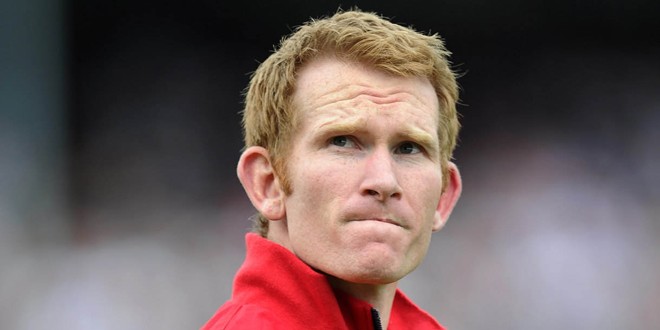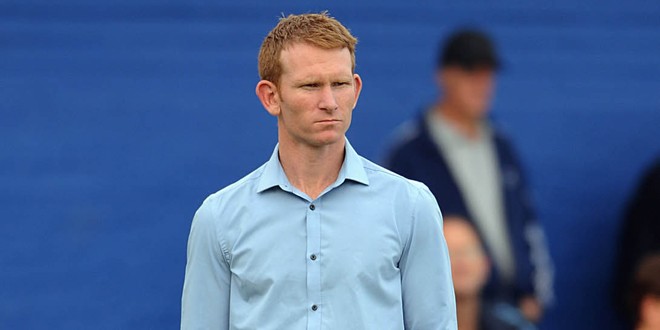
Super League’s newest coach has made an immediate impact at Wakefield, John Davidson sits down to hear the story behind James Webster’s early success…
The best young coach in Rugby League? James Webster just might be that.
Roosters boss Trent Robinson might have claims to that title and so could New Zealand Warrior’s mentor Andrew MacFadden. But at 35 Webster is the one of the youngest coaches in the sport and is part of a fresh new breed in Super League that includes Lee Radford, Chris Chester and James Lowes.
The turnover of coaches in the competition this year has been immense, with Tony Rea, Craig Sandercock, Brian Noble, Francis Cummins and Richard Agar all stepping aside or being removed from their roles in the past six months. Webster was handed the reins at Wakefield at the start of June after Agar decided to leave his post after two years in charge.
The Australian admits it was a decision that came somewhat as a surprise, considering Agar had a few years to go on his contract.
This article originally appeared in Rugby League World magazine. Click here to download the latest digital issue to your computer, smartphone or tablet
“But he knew he was struggling with it a little bit,” Webster explained. “He probably just wanted something different.
“It’s really hard mentally to keep rebuilding squads, and that’s what he had to keep doing. He could have easily sat here and taken the money for another two years but he took the punt. Obviously it’s worked for now but it would have been a brave man to work away from another two years as a head coach. It was a gutsy call, but he’s too good of a coach to be out of work.”
Webster shares a strong bond with Agar. He was an assistant under him at Hull FC and joined him when Agar took over at the Rapid Solicitors Stadium in 2012. Webster also has assisted Agar with coaching the French national team.

“Rich has been a fantastic bloke for me. He gave me my first start; he’s been a tremendous friend. He spent a lot of time trying to develop me as a coach, not just worrying about himself all the time. I have a lot of things to thank Richard for. We’re still good friends, I still speak to him quite regularly.”
Under Agar this season the Wildcats had managed just four wins from 15 games. They were battling against relegation and struggled to produce any consistent performances. The tipping point came on June 1 with Wakefield’s 20-12 loss to relegation rivals Bradford.
Under Webster, at the time of the interview, the club had won five games and drawn once in seven matches. The club and its rookie coach have surprised Super League with its gritty displays and high-profile scalps that included Leeds and Wigan in a five-game unbeaten run.
Webster is adamant that he hasn’t changed much since taking over.
“I think the boys have realised a couple of things, in that we had to improve in a couple of areas to be competitive,” he said.
“One was our defence, we haven’t changed too many structures. The boys have bought into what we identified what we need to do better.
“I’ve always said I don’t go out and make any tackles or carry the ball, they have to do it. They need the credit for what they’ve achieved. They’ve bought into it collectively as a group. We haven’t been brilliant in any or all of our games. We’ve come up with enough good plays to win games but we haven’t been great. Our defence and our attitude and our commitment have been fantastic.”
Humble and level-headed, Webster might not want to take any credit for Wakefield’s turnaround but his players are singing his praises. Wildcats skipper Danny Kirmond says the coach has had a massive effect.
“He’s given everyone confidence in their own ability and he seems to be getting the best out of everyone”.
Sometimes a fresh change and a new voice is what a group of players need to hear to spark an upturn in their futures. But anyone who watches Webster run a training session knows the red-headed former number seven is knowledgeable about the game, intelligent and a deep thinker. He understands the sport and knows what it takes to succeed at the top.
Webster never really stood a chance – he was always going to be involved in Rugby League. Growing up in Sydney’s north west, his parents were from the country and all of his family loved the game.
“All our relatives played Rugby League,” he explained. “I went to a Catholic school and played there as well. I started at five and have been playing ever since.”
Webster made his first-grade debut at scrum half for Balmain in 1999 and played in the club’s last game before it merged with Western Suburbs to form the Wests Tigers. “It was against Canberra, I remember Laurie Daley killed us”.
The slightly built halfback’s stint at Leichhardt Oval was short-lived, however, and he decamped to Parramatta in 2002. It turned into a brilliant move.
“The year before I went they smashed every record in the game,” Webster says.
“I thought it would be tough to get into this team. But I did get in the team in my first year, which was fantastic. I learned a lot at Parramatta, it probably guided me into coaching and learning more about the game. I was just a kid at Balmain, I just played what I saw.”
Webster hails the impact that veteran coach Brian Smith had on him during his three years with the Eels.
“They invested a lot the whole way through the club, no matter what part of the club you were at. It was a club about learning and I think every player, when they left Parramatta, they left as a better player. And that included me.”
Webster’s next move was to the UK, and to Hull KR in 2005, and he has been in the country ever since.
“I spoke to Brian about playing reserve grade and coaching the reserve grade when Jason Taylor was off with the first grade side. I was looking at taking that. I was actually in Mexico on an end of season trip and Harvey Howard emailed me and said there was a spot here. I was only 25 at the time so I decided to have a crack and keep playing.”
In England Webster made 93 appearances for the Robins before short stays at Hull FC and Widnes. He has a great affinity for the city of Hull.
“I loved every part of my time at Hull KR. I played, I coached there, we won stuff there, you felt a real resurgence of the club. Hull KR will always be a massive part of my life. I still live in Hull and the people of Hull have been fantastic.
“I loved my time at Hull FC, obviously I went there when I hurt my shoulder. It’s a good club, very well supported, I was just unlucky that I didn’t get as much time there as I did at Hull KR.”
The scrum half’s playing career had a quiet and inglorious end at Widnes. Webster’s solid but unspectacular time on the field was done.
“I didn’t play well, I played quite terribly at Widnes,” Webster admits. “It’s probably one of the regrets of my career. The way I finished up was not great. I finished up on a cold winter’s night at Leigh and we got beat. Richard (Agar) offered me a job the next day. I said I’m probably not doing well enough to keep playing, so I took it.”

A number of halfbacks have made successful coaches, such as Des Hasler, Shaun Edwards and Geoff Toovey. For Webster, he was drawn to coaching while he was still playing and first got the bug while at Hull KR.
“I had a taste of it for three months when I was captain-coach, when Harvey left after a couple of months,” he recalled. “It was something that whetted my appetite, I was lucky I had that kind of three months with Rich, even though I wasn’t able to play because of my cast, I was sitting with him in games and helping him out with certain things.”
Rugby League has given Webster a lot. It has been the focal point of his life and something he has been involved in for three decades. Webster says what he loves about the sport is that it doesn’t discriminate about class or background.
“I think Rugby League people take you on face-value, whether that be supporters or players or people inside clubs. I think it’s a game that’s fair, in that you kind of get what you deserve.
“You work hard you reap the rewards. It’s not an aloof sport or anything like that. Anyone can come and watch it; anyone can come and enjoy it. It’s safe and it’s accessible to a large amount of people.”
Success might have come very early in Webster’s career but the Australian is taking nothing granted. He knows form can be fleeting and the 2015 season will be another hard slog for Wakefield.
This article originally appeared in Rugby League World magazine. Click here to download the latest digital issue to your computer, smartphone or tablet
“I speak to my players about not falling in love with ourselves as a team. It’s important I don’t fall in love with myself as a coach either. It’ll be interesting when you have a whole pre-season to coach and the 27 rounds plus Challenge Cup. That’ll be the difference.”
Webster has ambition to try his hand at coaching in the NRL one day, however, he also knows coaching is an unpredictable job that can change after just one game, one result.
“I think if you start planning too far ahead you get caught,” he added.
“And realistically, at some stage, I’ll get the sack. Every coach gets the sack. I don’t know any coach throughout their career that hasn’t got the sack so it’ll happen at some stage.
“A lot of it is luck. A lot of it’s good timing. All you can do is do your best.”
The best young coach in Rugby League? Time will tell.
